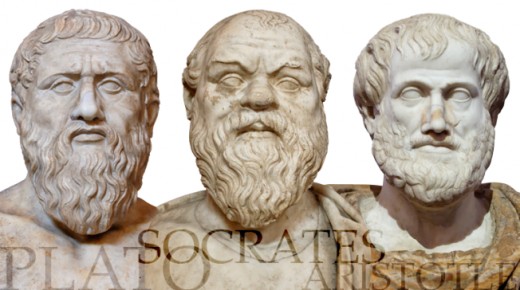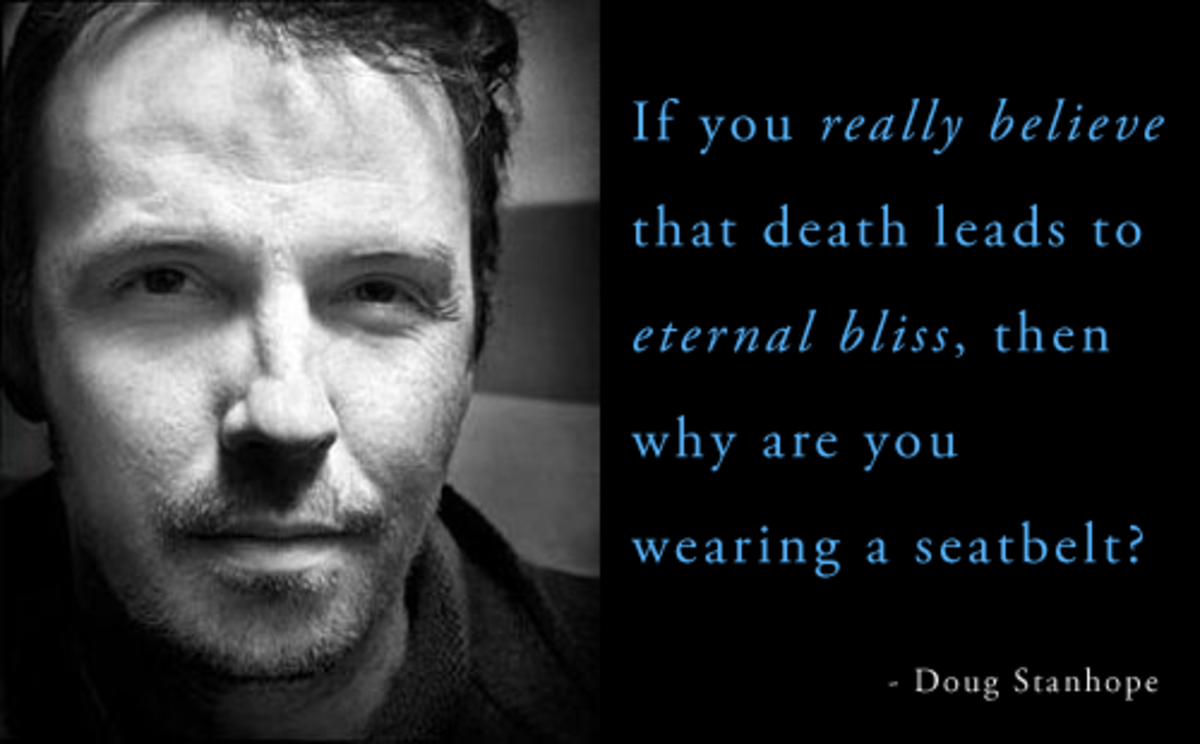Does God exist? (The argument from design)
Does nature tell us anything about God?

The "Teleological argument"
Following on from the first hub in the series, can we infer from the structure or 'seeming design' in the universe that it was designed? Does it show evidence of a 'Master architect' and if so then who was he?
In the last hub of this series we traced the origin of the argument that the universe had a beginning, and if there was a beginning then the theist would say that there must have been a 'prime cause' or creator!
Can you prove God exists with this argument? (actually I don't really like to use the term 'argument' but for want of a better term!)
As with the previous "Cosmological argument" it very much depends on whom you ask! Ask a theist and we'll say "of course you can" but the skeptic would say "Not enough evidence!"
Both the Cosmological and Teleological arguments rely on 'empirical evidence' to work, without the evidence both arguments fall flat.
The evidence for the Cosmological is that the universe had a beginning whereas the evidence for the Teleological argument is the order in the universe.
Does he really exist?

Where it all started
The word itself is made up of two Greek words, TELOS and LOGOS.
Telos literally means 'an end or purpose ' with the idea of 'giving purpose' to something or someone.
'Logos' can mean 'WORD' or 'REASON'. out the two together and you get 'Teleological' literally meaning 'To give a purpose or reason'
The Teleological argument seeks to use the order found in the universe to infer 'one who set the order in place' in other words it seeks to use order to explain the existence of God!
The first Western ideas in this area come from philosophers in Greece around the sixth century BC and the idea that the universe came into being with (for) a purpose.
Up to the time of Socrates Greek thought was that while a 'deity' may have been involved in 'design' he was not involved in sustaining it! Socrates disagreed strongly with the idea and argued that the 'demiurge' must be "Loving" to mankind at least (if not the whole of his creation)
More wise men
SOCRATES
Socrates is believed to be the first person to ever use a Teleological argument to explain the order in the universe. The record isn't found in his writing (Socrates himself left us no body of his literature, all we have about him is from other writers, mainly Plato and Xenophon!) but in Xenophon's writing about him. Xenophon also indicates that the argument itself is probably older and Socrates is simply following the argument of an older but unknown philosopher.
Xenophon was a disciple of Socrates and contemporary of Plato.
ARISTOTLE
Aristotle went further in saying that the only way to the understand why something is 'that way' is to look at the purpose they were designed for! For example we can look
at various parts of an animal's anatomy but its only when we see the parts functioning together that we can see what each part was designed for!
Aristotle's premise is that everything is 'ordered' for a reason, even human life is ordered towards 'rationality' because Humans are rational creatures and 'rationality' is our final cause "and highest aim is to fulfill our rationality" (quoted from msparknotes.com)
They were the first western philosophers to argue God's existence from the order of the universe, but they weren't the first people to argue it.
The three wise men

So, Who was then?
Seven hundred years before a writer penned the words 'The heavens declare the glory of the LORD. The skies proclaim the work of his hands' (Psalm 19 verse 1). Commonly attributed to King David around 1,000 BC. Later another writer contemplating life without God said "Everything is meaningless" when you examine things without God (Ecclesiastes chapter 1).
I'm not here to debate who wrote these and when, but even if you follow the absolute latest date the Psalms and Ecclesiastes were written they still pre-date Socrates by at least two or three hundred years!
Maybe instead of Socrates, Plato and Aristotle influencing the Abrahamic religions it was the other way round? Just a thought.
The Heavens Declare
The Stoics
THE STOICS
The Stoics were the next (after Socrates and Aristotle) to develop a systemic argument for God's existence "from design" but the main difference was that they believed that the universe itself was a physical 'manifestation' of God!
"Constantly regard the universe as one living being, having one substance and one soul" (Marcus Aurelius, Roman Emperor)
It's the Stoics that developed a series of arguments using the order in the universe to argue that it is 'alive' and we are a part 'emanating from' and one day our souls will 'return to' being absorbed back into nature (different to the Christian idea of our souls residing with God as separate entities)
Where to find the first argument for God

Medieval Times
In the early part of the Medieval times and with the collapse of the Roman Empire in the West it was the Eastern Empire and later the Islamic world that preserved and translated Plato and Aristotle. Al Ghazali knew their works but it was Thomas Aquinas who developed Aristotle's premise into one of his five ways of knowing God exists.
Aquinas differed from the Stoics in that he agreed more with Aristotle that God is 'incorporeal' in that he doesn't have a physical form but can be 'known' through his interaction with creation through his 'thoughts and will'
Aquinas saw a 'fivefold proof of the existence of God' Three of which are Cosmological in nature and the fifth being design or order in creation. (www.iep.edu. Thomas Aquinas)
Aquinas's argument was to be the main argument for 'design' right up until the start of the nineteenth century when William Paley put forward an analogy that has since become famous and is almost seen as the epitome of the argument from design for a designer!
Criticism of the Watchmaker analogy
The Watchmaker Analogy
The Watchmaker analogy, often presented as a prelude to discussion of the Teleological argument is simply that when we look at the intricate workings of a watch we see evidence if a designer. In the same way when we look at the intricate and precise workings of our universe we also see evidence of a designer!
The interesting part is that the analogy was first put forward in 1802 but Darwin's Origin of the species didn't get written until the late 1850s so rather than the analogy being a reply to naturalistic evolution Darwin's work was a reply to the analogy!
The analogy makes use of the concept that the laws of nature that ordered the universe are the same that were at the beginning and have not changed hence if such order would require a designer now then they must have required such in the past!
Deists such as Thomas Jefferson who accepted that Deity created the universe but has since then had nothing to do with it accepted this theory and analogy even arguing that there was no conflict between the Watchmaker analogy and 'Deistic evolution'
The basic outline of the analogy is that if we were to take the back off a watch (watches back then were mechanical and not electronic) we would see a myriad of intricate parts that all perform differing functions within the watch but all are required for the watch to function.
From the way the watch works we deduce that the watch had to have had a 'watchmaker' who designed and built the watch. It could not have come together by chance, or by accident but had to have been designed and built with a purpose which was to enable us to tell the time!
By inference Paley argued that just as the watch has a watchmaker so the universe also can been seen as a myriad of intricate parts that all work together and show evidence of a designer!
The analogy puts a good argument for design together but itself has some flaws in it. For one thing it allows for the designer to build the watch but not necessarily for interaction later. Deists like Jefferson liked the idea as it fit with their idea that God may have put the universe together but then left it long ago to function according to the Laws and principles that he'd put in place!
The analogy fell out of favor in the mid nineteenth century but since the 1960s has started to make a comeback in its own right.
The Watchmaker leads us to the next argument
Modern Teleological arguments
In the last fifty years science has moved forward at an incredible pace, so much has been learned that it's estimated that fifty years ago man was literally doubling the amount of knowledge that he had about the universe every ten years. Today it's estimated that his knowledge of the universe doubles every eighteen months!
Man is learning so much about the place where he lives that he's had to build enormous computers just to store the information, and the knowledge grows every day.
Since the 1960s man has begun to unravel some of the mysteries of life but as he's done so he's come across some stunning things, things that have stopped atheists in their tracks and even forced them to admit that there seems to be design in the universe and in creation!
The arguments for design in the past have come mainly from the fields of Theology and Philosophy but the modern arguments are coming from the sciences themselves!
Scientists have long thought that if God created the universe he would have done it following the laws of nature, using the idea that if we can observe something now that performs a certain way then unless we can find evidence in the past for a change then it must have performed that way in the past! (makes sense really) and while science was pointing away from God that was fine, but starting in the 1960s discoveries were made that started to point towards a creator
The following sciences all have proponents of an argument for design
- Physics
- Chemistry
- Genetics
- Biology
- Astronomy
These are just a few of the sciences that in the last fifty years have revealed things that have pointed to design in the Universe so much so that celebrated Atheists like Sir Fred Hulme was quoted as saying that the evidence for design in Astronomy is so compelling that it "Shakes my atheism to it's core!"
Or Richard Dawkins admitting that Genetics at a cellular level has the "Appearance of design" (he says it's our own genetic code playing tricks on us!)
The main ways that the Modern arguments are put about are
- Fine tuning of the universe
- The Anthropic principle
The two have so many points both for and against them that it would need more than one hub to even scratch the surface of them so I might come back to them in other hubs to debate them.
Rounding off
This hub isn't meant so much as a debate on the argument from design but to lay a foundation so that we know where the argument comes from and what the main points are.
Having said that I realize that some will disagree with me on some points and that's fine as long as we can use the hub and the posts to learn from each other and hopefully we all go away with a better understanding of the wonderful universe we live in.
Hope you enjoyed the hub and feel free to let me know what you think in the comments
Lawrence
The Anthropic principle
- Anthropic principle - Wikipedia, the free encyclopedia
- What is the Anthropic Principle?
What is the Anthropic Principle? Does the universe and life show signs of being intentionally designed? Is the planet earth perfectly designed to sustain life?








